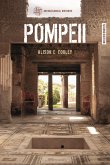This book revolves around the shaping of Roman domestic space and cultural issues of privacy and representativeness. At the core is a set of lavish rooms where layout, architecture and décor bespeak the presence of one or two beds suitable for sleep or daytime rest. For the first time, the author restores the rich contextual readings regarding the dense network of location, architecture, accessibility, lighting, landscape, decoration. In Pompeian houses alcove cubicula were among the key reception rooms. Their images acted as prime symbols of power, as real weapons in strategies of distinction. Luxury, lifestyle, prestige, and the debates around them seem to be primarily related to the design of these comparatively small environments. No other type of room shows such quick adaptation to the most up-to-date trends, owing to a series of real revolutions in fashion first developed for lavish patrician residences, then spread among medium-, later even small-size abodes throughouttown. In the realm of domestic life, alcove rooms constitute a sound source for inquiring into the different tastes of Pompeii's various social groups. Defined by financial means and social affluence, their tastes ranged from aesthetics of luxury to an ordinary reception of trivialized clichés.
Hinweis: Dieser Artikel kann nur an eine deutsche Lieferadresse ausgeliefert werden.
Hinweis: Dieser Artikel kann nur an eine deutsche Lieferadresse ausgeliefert werden.








